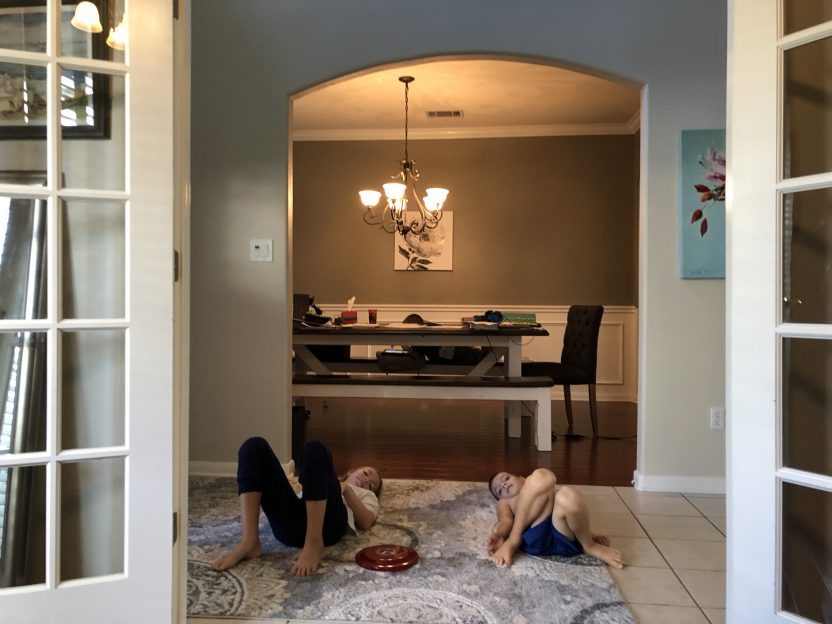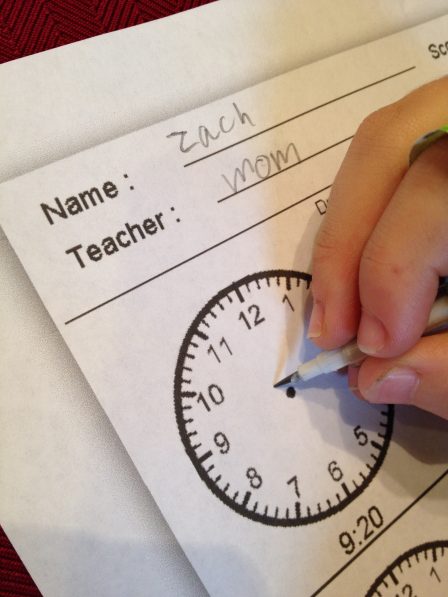Many school districts across the country are closing, more will likely be closed by the end of the week. You may have woken up to the news that you’re now a HOMESCHOOLING PARENT for the foreseeable future!
I’ve seen Facebook posts from friends who are panicked at the thought of it. They never wanted to homeschool. And, now, that’s there only option. But I want to encourage you, you can successfully homeschool in quarantine. You may even enjoy it!
I’ve been homeschooling for 7 years–since my oldest was in first grade. In the beginning, I was terrified to try it. And, I (falsely) believed that if I decided to homeschool–I’d have to put any career plans on hold for at least 18 years.
But the reality is, since I started homeschooling 7 years ago, I’ve written 2 books, blogged, produced podcasts, and even held steady consulting jobs. Truth is, I’ve consistently worked 25+ hours/week from home. Homeschooling and “having a life” or “having a job” do not have to contradict each other.
As we face Corona-related quarantines and school closings and social distancing, you may be forced to homeschool for the foreseeable future. Or, maybe you’ve considered homeschooling and are looking at this forced time at home to try it. Here are some of the most helpful things I’ve learned over the years.
I hope these tips will help you as you embark on a temporary homeschooling adventure.
1) Start your day with prayer.
Seriously friend. If you weren’t doing it before – this is a great time to start. Pray that God will fill you with peace, love, and patience. Pray that he’ll bring a spirit of peace over your home. And pray that you’ll surrender your will (your schedule, to do list, etc. . . ) to God’s plans and purposes for the day.
2) Chill out.
Homeschool doesn’t look anything like regular school. If you have the freedom, don’t try to make your children sit still all day long or work for long stretches without breaks. Take advantage of the opportunity to let your kids relax! Let them sleep in or stay in their pajamas ’til noon if they want.
Let them learn multiplication tables by lying on the floor reciting them to the ceiling; read lying on a swing in the backyard. If you feel frustration rising in both you and your child – take a break! Send them outside to run laps or ride their bike. Grab another cup of coffee and get something “done” for a few minutes until they’re ready to work again.
You’re not a teacher of a class of 25 kids. You’re the parent-teacher. Mom teachers (and Dad teachers, too) have special privileges. Use what you know about your child to make school work for you. If your child does best in the morning – get the work done before lunch. If your child is slow to “warm up”–carve time to work with them in the afternoon.

3) Take Your Time.
If you’ve got other work to do–a job that’s depending on you to work from home–remember that homeschooling doesn’t have to match the exact time frame of the public school. One study I read a number of years ago said that it took 8 minutes a day to keep up with public school in the early elementary years. At school there’s a lot of time that’s spent transitioning between subjects, taking “brain breaks,” or waiting for other kids to finish the assignment given to the class.
You may have a “type A” firstborn who will sit and get all the work done in an hour and a half in the morning. Or, you may have a middle child who’d rather do a little work, play Legos for 30 minutes, and come back and do a little more. Just like adults, somedays your child may be extremely productive and want to work ahead. Other days, it may be difficult to get through one subject with frustration.
You have the flexibility to adjust on a daily basis–so surrender your agenda and relax. Unless your child is following along with an online class–take advantage of the opportunity to let your child gently learn on the time schedule that works best for them.
4) Limit Screen Time.
I’ve found that homeschool goes best if the limits on the screens are tight during our school week. Unending hours of video games in the afternoon or evening can make the next day harder than it has to be! Though your children WILL complain, fuss, and express fears of dying of boredom (and though you will fear you’ll never get anything done because of their dramatic performances over not getting screens) my best advice is to not set a precendent of your child spending half the day on school and the other half on video games.
Instead, your home will remain more peaceful if your children are encouraged to do other, screen-free things during the day. Maybe offer one hour (timed) of video games after dinner for good attitudes during the day or as a reward for completing school work diligently. If you can survive the initial detox period – you will be amazed at how your children can find other things to do that don’t involve screens.
Give their imaginations some room to breathe and you’ll all enjoy being home together more. (P.S. Fridays, Saturdays, and Sundays we do allow more screen time-if work was completed during the week.)

5) Learn About & With Your Children.
If you’re like me, life was too busy to pay too much attention to what my children were learning in public school. But, with them home — I’ve had an incredible opportunity to learn beside them and learn about them. What subjects are they most interested in (and best at)? What topics interest them to the point where we should find other resources to supplement what they’re learning? You Tube isn’t all DIY plumbing and make-up tutorials. You’d be amazed at the helpful and kid-friendly videos you’ll find on everything from wars to learning division. For older children – try Khan Academy for classes in just about every subject. Watch together and supplement what both of you are learning!
6) Keep first things first, then you’ll have time for the rest.
This is a lesson I have to re-learn monthly. If I try to “cheat” my schooling time with my children by brushing them off until I “finish something quickly” — this creates a frustrating morning. If I get up, read my Bible, pray (see number 1 above), and then help my children with their school for a few hours– it’s amazing how God provides the time for me to get the rest of my work done.
My typical schedule is to work with my children from 8:30-11am. This is plenty of time for my 3rd and 4th graders to complete all of their work. If my 7th or 6th graders need help later in the day – we schedule it. “Mom has to get work done from 12-2pm -but I’ll help you with that at 2 – you do this part of it before we meet.” Children can be taught to give you some space and be respectful of your time as well. But this lesson is learned easier if you’re first willing to designate time that’s just for them.

7) Have fun.
So this is my Enneagram 7 coming out. A small part of the reason why I homeschool is I can’t possibly get 4 kids out to the door with homework, and lunches, and library books every morning. That sounds like a lot of work!!
The truth is — I really, really love homeschooling. I love hanging out with my kids each day. It is a joy. We have fun. We take bike rides to the park or Dunkin Donuts. They spend time teaching themselves to cook or creating obstacle courses in our back yard. This quarantine may be your chance to just have fun together as a family. A lot of learning can happen when playing Monopoly or building a Lego model of something they learned about in school.
Talk to your children. They have things to say and want you to stop and listen. Ask them questions. Encourage them to try new things like drawing from a tutorial or banging on the keys (gently, and not when mom is on a conference call) of the dusty piano in the hall. Teach them out to clean, how to do laundry, what the difference between Windex and counter cleaner is and why they should never use the latter on your bathroom mirror. Play in the yard. Write someone a letter. This time is your’s friend. This virus may be cramping your regular style, but why not make something absolutely beautiful out of it.
**P.S. I understand that school closings can mean financial hardship for some. I’m sensitive to the reality that our world is changing quickly and this crisis will have a severe impact on some. The point of this piece is not to dismiss the plight of those for whom school closing creates further hardship, rather to encourage those who are nervous about having their children at home and what that will look like for their education.





